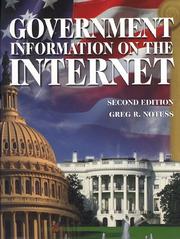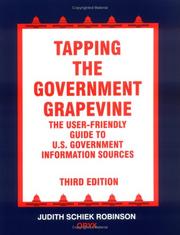| Listing 1 - 10 of 1017 | << page >> |
Sort by
|
Book
ISBN: 071463221X Year: 1983 Publisher: Totowa (N.J.) : Cass,
Abstract | Keywords | Export | Availability | Bookmark
 Loading...
Loading...Choose an application
- Reference Manager
- EndNote
- RefWorks (Direct export to RefWorks)
Book
Year: 1982 Publisher: Genève : Droz,
Abstract | Keywords | Export | Availability | Bookmark
 Loading...
Loading...Choose an application
- Reference Manager
- EndNote
- RefWorks (Direct export to RefWorks)
Book
ISBN: 2706150386 Year: 2021 Publisher: FONTAINE : Presses Universitaires de Grenoble, PUG,
Abstract | Keywords | Export | Availability | Bookmark
 Loading...
Loading...Choose an application
- Reference Manager
- EndNote
- RefWorks (Direct export to RefWorks)
"En quoi la question de la donnée transforme-t-elle l'action publique urbaine ? Dans quelle mesure son émergence déstabilise-t-elle les organisations et les institutions existantes ? Quels sont tes rapports entre acteurs publics et privés qui se jouent au travers de la mise en circulation de ces données ? Ne constituent-elles pas de nouvelles ressources pour la régulation des villes par les pouvoirs publics ? En s'appuyant sur une enquête ethnographique de quatre années au sein d'une collectivité française, le livre suit la chaîne des données, de leur production à leur mise à disposition puis leur réutilisation, pour analyser les recompositions de la gouvernance urbaine. Ce livre, au coeur de l'actualité, ouvre le débat sur les manières dont les pouvoirs publics peuvent gouverner les données pour conserver ta maîtrise du pouvoir sur la ville à l'ère du numérique."--Back cover.
Book
Year: 1978 Publisher: Washington, D.C. : U.S. G.P.O.,
Abstract | Keywords | Export | Availability | Bookmark
 Loading...
Loading...Choose an application
- Reference Manager
- EndNote
- RefWorks (Direct export to RefWorks)
Book
Year: 1978 Publisher: Washington, D.C. : U.S. G.P.O.,
Abstract | Keywords | Export | Availability | Bookmark
 Loading...
Loading...Choose an application
- Reference Manager
- EndNote
- RefWorks (Direct export to RefWorks)
Book
ISBN: 9034632881 Year: 1996 Publisher: Den Haag Rathenau instituut
Abstract | Keywords | Export | Availability | Bookmark
 Loading...
Loading...Choose an application
- Reference Manager
- EndNote
- RefWorks (Direct export to RefWorks)
Book
Year: 2002 Publisher: Fort Monroe, Va. : Dept. of the Army, Headquarters, U.S. Army Training and Doctrine Command,
Abstract | Keywords | Export | Availability | Bookmark
 Loading...
Loading...Choose an application
- Reference Manager
- EndNote
- RefWorks (Direct export to RefWorks)
Electronic government information --- Government information

ISBN: 0890591091 Year: 1998 Publisher: Lanham Bernan
Abstract | Keywords | Export | Availability | Bookmark
 Loading...
Loading...Choose an application
- Reference Manager
- EndNote
- RefWorks (Direct export to RefWorks)

ISBN: 1573560243 9780313097621 0313097623 9781573560245 1282419862 9781282419865 9786612419867 6612419865 Year: 1998 Publisher: Phoenix, Arizona
Abstract | Keywords | Export | Availability | Bookmark
 Loading...
Loading...Choose an application
- Reference Manager
- EndNote
- RefWorks (Direct export to RefWorks)
Judith Schiek Robinson has updated and expanded this popular guide, which offers a thorough and sometimes humorous tour of government information sources. Her highly readable text explains the intricacies of government information and how to find sources that meet specific research needs. New features in the third edition include detailed coverage of Internet resources, directories of World Wide Web addresses, and quick tips on which government Web sites to search for different types of information. Helpful guides to government abbreviations and citations are also included, as are numerous new
Book
ISBN: 0231545800 9780231545808 9780231184984 0231184980 9780231184991 0231184999 Year: 2018 Publisher: New York
Abstract | Keywords | Export | Availability | Bookmark
 Loading...
Loading...Choose an application
- Reference Manager
- EndNote
- RefWorks (Direct export to RefWorks)
Today, transparency is a widely heralded value, and the U.S. Freedom of Information Act (FOIA) is often held up as one of the transparency movement’s canonical achievements. Yet while many view the law as a powerful tool for journalists, activists, and ordinary citizens to pursue the public good, FOIA is beset by massive backlogs, and corporations and the powerful have become adept at using it for their own interests. Close observers of laws like FOIA have begun to question whether these laws interfere with good governance, display a deleterious anti-public-sector bias, or are otherwise inadequate for the twenty-first century’s challenges.Troubling Transparency brings together leading scholars from different disciplines to analyze freedom of information policies in the United States and abroad—how they are working, how they are failing, and how they might be improved. Contributors investigate the creation of FOIA; its day-to-day uses and limitations for the news media and for corporate and citizen requesters; its impact on government agencies; its global influence; recent alternatives to the FOIA model raised by the emergence of “open data” and other approaches to transparency; and the theoretical underpinnings of FOIA and the right to know. In addition to examining the mixed legacy and effectiveness of FOIA, contributors debate how best to move forward to improve access to information and government functioning. Neither romanticizing FOIA nor downplaying its real and symbolic achievements, Troubling Transparency is a timely and comprehensive consideration of laws such as FOIA and the larger project of open government, with wide-ranging lessons for journalism, law, government, and civil society.
| Listing 1 - 10 of 1017 | << page >> |
Sort by
|

 Search
Search Feedback
Feedback About UniCat
About UniCat  Help
Help News
News